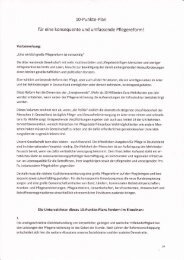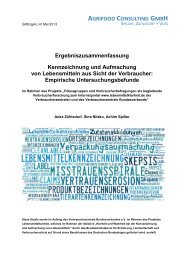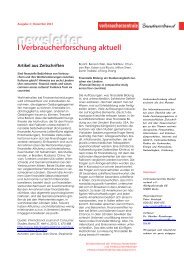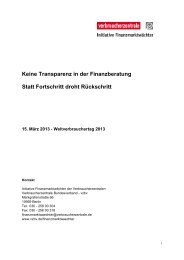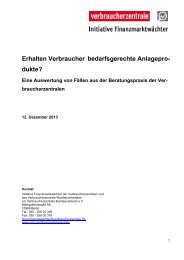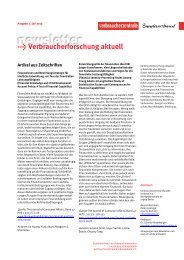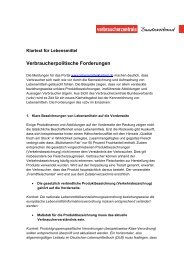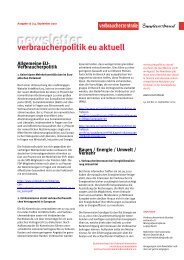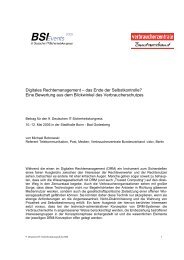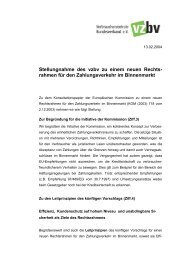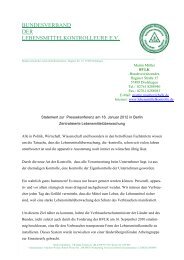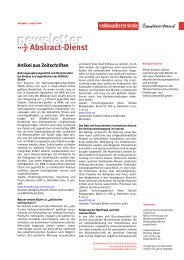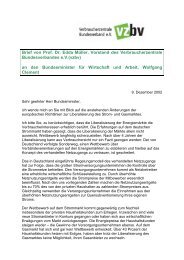Schlussbericht über das Projekt: "Wettbewerbsrechtliche ... - vzbv
Schlussbericht über das Projekt: "Wettbewerbsrechtliche ... - vzbv
Schlussbericht über das Projekt: "Wettbewerbsrechtliche ... - vzbv
Sie wollen auch ein ePaper? Erhöhen Sie die Reichweite Ihrer Titel.
YUMPU macht aus Druck-PDFs automatisch weboptimierte ePaper, die Google liebt.
Wettberbsrechtliche Kontrolle von grenz<strong>über</strong>schreitenden 33 Marketingmaßnahmen <strong>vzbv</strong> 2001<br />
Anhang I: Vortrag <strong>über</strong> <strong>das</strong> <strong>Projekt</strong> auf der IMSN-Konferenz in Bern (12. – 14.<br />
September 2001)<br />
Project by the Federation of German Consumer Organizations on<br />
Cross-border Advertising<br />
Due to the globalization and liberalization of markets over the past few years more<br />
and more companies straddle international frontiers in their operations. Many<br />
companies shifted their offices to neighboring European countries and target their<br />
offers on German consumers via conventional media or via the Internet. This practice<br />
caused an additional control requirement for consumer organizations in Germany.<br />
Against this background, the Federal Ministry of Economics approved a 2-year<br />
project by the Federation of German Consumer Organizations focusing on the task of<br />
scrutinizing advertising material mailed to Germany in terms of consumer protection<br />
and to legally restrain it. The project is to run until the end of 2001, but some results<br />
have already emerged I would like to briefly present to you.<br />
First to the legal background behind the activities of the Federation of German<br />
Consumer Organizations:<br />
The federation is a non-governmental organization authorized by law to issue<br />
cautions for fraudulent advertising or competitive behaviour to the detriment of<br />
consumers. This caution takes the form of a notice in writing to the company setting<br />
out the statutory offence coupled with the demand to issue a so-called declaration of<br />
forbearance liable to sanctions. This declaration is a civil contract in which the<br />
company undertakes to refrain from the objectionable act and to pay a contractual<br />
penalty to the federation in the event of infringement. Once the company has issued<br />
this declaration, the affair is settled for the time being. Otherwise the federation files a<br />
suit against the company requesting the court to order the company to discontinue<br />
the abuse to which objection was made. (This much for my introduction into German<br />
law for today).<br />
To date, 100 foreign companies have been cautioned within the framework of this<br />
project. Only in 13 cases did this out-of-court caution procedure end in the making of<br />
a forbearance declaration by the company. In 17 cases an action for an injunction<br />
was filed, of which 6 have meanwhile been settled through a verdict. 34 out-of-court<br />
caution procedures had to be stopped as those responsible could not be identified.<br />
36 out-of-court procedures are still under way.<br />
Thematic areas<br />
The objectionable advertising mainly came from the following fields: fax advertising,<br />
advertising for slimming products and sweepstake advertising.





